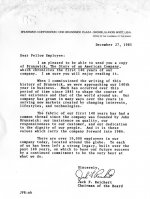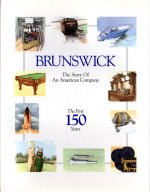Thanks for posting this article. Anyone interested in obtaining a broad knowledge of our sport should read the entire article. Brunswick is out of the billiard business -- in June 2019, Brunswick sold its billiards division to KPS Capital Partners. (Someone had best archive the Brunswick History information from its website as it may soon disappear.) Ultimately, Brunswick owes its success/survival to diversification. However from the player's point of view, we must ask, especially given its tremendous effort to control all aspects of billiards in the first half of the twentierh century, what effect did Brunswick's diversification have on the sport of billiards? (Also, it would be very interesting to know when and why Brunswick determined that it was no longer interested in obtaining vertical control of all things billiards.)
As the author sums up, "[m]ost great companies focus on one business and central skill. UPS, Deere, Caterpillar, Paccar, and Home Depot come to mind. Diversification (lack of focus) as a business strategy grew in the conglomerate era of the 1960s. Many of the companies that existed before the 1960s went the conglomerate route, then later “deconglomerated” (Colgate-Palmolive among the most successful) . . . Blowing with the wind, including conglomeration, Brunswick has usually been a leader in each of its many fields. From jazz records to camouflage, the company has a history of quality. In its 175 years, Brunswick has successively been the dominant factor in the billiards industry, the bar industry, the bowling industry, the hypodermic needle industry, and now the boat and engine industries . . . Our study of great companies implies that they should usually stick to one industry. Perhaps even rename their company after their most important operation, as did Dayton-Hudson and Melville Corporation (becoming Target and CVS, respectively). Mercury Marine might be a good moniker for Brunswick as it stands today."
This article focuses upon the effect of the company's business practices upon itself. What we players need to know is the effect such business practices upon our beloved sport.
Here are some quotes/information from the article which I found most insightful and interesting:
In 1908, Brunswick produced 400,000 cues and "was the world’s largest buyer of hardwoods and operated the largest lumber drying kilns on earth."
"y the 1920s, there were more than 42,000 American pool rooms, 4,000 in New York City alone. Detroit’s Recreation pool hall had an amazing 142 tables. San Francisco’s Graney had a 400-seat spectator gallery."
Brunswick "1928’s record sales of $29 million dried up. In 1932, the sales figure was $3.9 million, a drop of almost 90% . . . most of Brunswick’s revenue was from recreational spending."
"The billiards business boomed briefly as a result of the 1961 Paul Newman and Jackie Gleason movie, The Hustler."





